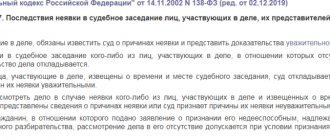Consideration of a case in court is a procedure clearly regulated by law, therefore almost all court hearings follow a similar scenario. However, if you are in court for the first time, much of what happens in the courtroom may be surprising or confusing. From our material you will learn how the trial proceeds and what stages the consideration of the case consists of.
At the same time, if you do not have a legal education and experience in participating in litigation, we recommend that you definitely seek help from a lawyer. Consideration of a case in court is a very responsible process. Therefore, any - even seemingly insignificant - mistake can lead to extremely negative consequences (especially in matters that concern property).
Do you want to figure it out, but don’t have time to read the article? Lawyers will help
Entrust the task to professionals. Lawyers will complete the order at the cost you specify
280 lawyers on RTIGER.com can help with this issue
Solve the issue >
What do legal proceedings consist of?
First of all, let's figure out how cases are considered. Most often, ordinary people have to deal with cases that are considered according to the rules of civil procedure. So, for example, if you are suing a store, employer, management company, neighbors, car service center, etc. – these are all civil matters.
The hearing of the case takes place orally, and a mandatory component of the court’s work is the direct examination of evidence. It is for this purpose that testimony of witnesses, expert opinions and explanations of third parties are heard. Also during the proceedings, they may inspect physical evidence, view video recordings and study various written evidence.
Court proceedings are usually divided into the following parts:
- preparatory;
- consideration on the merits;
- debate;
- making a decision and announcing it.
It should be noted that very rarely all these stages are performed in one court session. As a rule, the consideration of a regular case takes up to 3-4 meetings. If any unforeseen circumstances arise or the case is very complex, the proceedings can drag on for quite a long time.
What is the preparatory part of the meeting?
The preparatory part is necessary so that the court can find out whether it is possible to consider the case at this hearing. For this purpose, they find out whether the composition of the court is acceptable, whether it is possible to examine the case taking into account those persons who came to the hearings, and whether it is permissible to begin the trial with the available evidence. The beginning of this stage is the opening of the meeting.
After the meeting is open, the secretary must report which of the summoned persons has appeared in court. In addition, the identities of those present are established, and rights and responsibilities are explained. Also in this part they decide what consequences the failure of any of the persons who have been summoned to the meeting will have. If a party fails to appear in court for a valid reason, the hearing may be postponed. If the reasons are not valid, the trial takes place without absent persons.
How is the case considered on its merits?
After all organizational issues have been resolved, the judge proceeds to report on the substance of the requirements, circumstances and existing objections. Next, they must find out whether the plaintiff (i.e., the one who filed the claim) supports his claims and whether the defendant in the case recognizes them. Also at this stage, the judge must clarify whether the parties have a desire to end the case with a settlement agreement. If the parties do not want to reconcile, then the parties begin speaking. The meeting is held in such a way that first the plaintiff is given the floor, and then the defendant.
After the plaintiff and defendant have spoken, the floor may be given to other parties (for example, witnesses). At the same stage, the evidence is analyzed and the results of the examination are heard. If the trial is held with the participation of a prosecutor or other official representing a government agency, he must also be given the floor.
Important! Persons participating in the case may ask questions to the speakers to clarify the circumstances. The judge can also ask clarifying questions to the speakers (and the judge can do this at any time during the speech).
What are legal pleadings?
Completion of the consideration of the case on its merits means the transition to judicial debate. How is this part of the proceedings going? The debate itself is a series of speeches by the participants in the case, based on the results of which conclusions are drawn based on the evidence presented. That is, judicial debates allow us to summarize and, accordingly, find out what facts can be considered established. Sequence of speeches at this stage:
- The plaintiff and his representative.
- The defendant and his representative.
- Third parties making independent claims.
If the meeting is held with the participation of the prosecutor, then he must speak first in the debate. Third parties who do not make independent claims speak either after the plaintiff or after the defendant (the order of speaking is determined by which side they are on). It should be noted that in your speeches you cannot refer to evidence that has not been examined in the case that is being held in court. But, of course, sometimes it happens that in a debate the need to explore new evidence becomes obvious. In such a situation, a trial on the merits must take place again.
Important! Each of those participating in the debate can speak again (if he has something to say about what he heard from other people). In this case, the right of the last remark is given to the defendant.
How is the decision made?
The main outcome of the proceedings is the adoption of a decision. This stage is the final one, and it begins immediately after the debate takes place. In order to make a decision, the court announces a break (sometimes it takes several days). It should be noted that only those judges who took part in the consideration of the case can participate in making a decision.
If, when making a decision, the judge realizes that there is a need to clarify new circumstances, the court proceedings will resume. If there is no need for this, then after the decision is made, the judge (or judges) returns to the room in which the trial is taking place and announces the decision. This is done publicly. The exception is those cases when meetings are held behind closed doors (for example, the results of adoption cases are not publicly announced).
As a rule, after a decision is made, only the operative part is announced to those present. It contains information about whether the person’s claims have been satisfied or whether his claim has been denied. In this case, the court has the right to satisfy the requirements both in full and in part. In order to prepare the full text of the decision, the court will have 5 days.
Stage of scheduling a court hearing
Stage of scheduling a court hearing
- This is the independent stage of criminal proceedings following the end of the preliminary investigation.
This stage is a check on the part of the judge of the received case regarding the quality of the preliminary investigation. At this stage, it is checked whether the case received is within the jurisdiction of this court, whether there are grounds for scheduling a preliminary hearing, and whether it is possible to schedule a court hearing (Article 227 of the Code of Criminal Procedure of the Russian Federation). Having examined the criminal case, the judge makes a decision stating:
1) time and place of the decision;
2) the name of the court, surname and initials of the judge who made the decision;
3) the grounds for the decision made.
The decision is made no later than 30 days
from the moment the criminal case is received by the court, and in a criminal case in which the accused is held in custody - within
no later than fourteen days
.
Article 228 of the Code of Criminal Procedure of the Russian Federation provides a list of questions that are required to be clarified in each criminal case brought to court. These include the following questions:
1) whether the criminal case is within the jurisdiction of this court. If the judge has determined that the given criminal case is not within his jurisdiction, he sends it to another judge, or to another court in accordance with the rules of jurisdiction (Part 1 of Article 34 of the Code of Criminal Procedure);
2) whether copies of the indictment or indictment were served. In Part 2 of Art. 233 of the Code of Criminal Procedure of the Russian Federation contains an indication of the time limit before which the accused must be given a copy of the indictment or indictment, according to which the court hearing cannot begin earlier than seven days from the day the accused is served with the specified copy
.
Having established that a copy of the indictment or indictment was not served on
, the judge checks whether there was a refusal to receive a copy of the indictment (indictment) or perhaps the accused did not appear when called or otherwise evaded receiving a copy of the indictment (Part 4 Article 222 of the Code of Criminal Procedure). If the case materials do not contain any indications from the prosecutor regarding these circumstances, the judge, in accordance with paragraph 2 of Part 2 of Art. 229 of the Code of Criminal Procedure of the Russian Federation appoints a preliminary hearing, based on the results of which, on the basis of clause 2 of part 1 of Art. 237 of the Code of Criminal Procedure of the Russian Federation returns the criminal case to the prosecutor;
3) whether the preventive measure chosen for the accused is subject to cancellation or change. In this case, the judge is guided by the rules of Art. 110 Code of Criminal Procedure of the Russian Federation;
4) whether the submitted petitions and filed complaints are subject to satisfaction (after the prosecutor approves the indictment or indictment and sends the criminal case to the court, all complaints and petitions are also sent to the court for consideration);
5) whether there are grounds for holding a preliminary hearing listed in Part 2 of Art. 229 Code of Criminal Procedure of the Russian Federation;
6) whether measures have been taken to ensure compensation for damage caused by the crime and possible confiscation of property. If such measures were not taken during the preliminary investigation, then the judge, at the request of the victim, civil plaintiff or their representatives, or the prosecutor, has the right to make a decision on taking measures to ensure compensation for damage caused by the crime, or possible confiscation of property. The execution of this resolution is entrusted to bailiffs (Article 230 of the Code of Criminal Procedure).
Article 231 of the Code of Criminal Procedure of the Russian Federation provides that in the absence of any obstacles to the consideration of the criminal case on the merits, the judge makes a decision to schedule a court hearing without a preliminary hearing. This resolution on scheduling a court hearing resolves the following issues:
1) the place, date and time of the court hearing;
2) on the consideration of a criminal case by a single judge or by a court collegially (in this case, collegiality means only the consideration of a criminal case by a court consisting of three federal judges, since if it is necessary to consider the case by a jury, a preliminary hearing is mandatory);
3) on the appointment of a defense attorney in cases where the accused is a minor; or due to physical or mental disabilities he cannot independently exercise his right to defense; or does not speak the language in which the criminal proceedings are being conducted; and also when a person is accused of committing a crime for which a sentence of imprisonment for a term exceeding fifteen years, life imprisonment or the death penalty may be imposed; a criminal case is subject to trial by a jury; the accused filed a petition to consider the criminal case according to a special procedure for making a court decision with the consent of the accused with the charge brought against him (clauses 2-7, part 1, article 51 of the Code of Criminal Procedure).
4) summoning persons to the court hearing according to lists submitted by the parties;
5) on the consideration of a criminal case in a closed court session in the following cases: when the hearing of a criminal case in court may lead to the disclosure of state or other secrets protected by federal law; criminal cases of crimes committed by persons under the age of sixteen are considered; criminal cases are being considered regarding crimes against sexual integrity and sexual freedom of the individual and other crimes, which may lead to the disclosure of information about the intimate aspects of the lives of participants in criminal proceedings or information that humiliates their honor and dignity; this is required by the interests of ensuring the safety of participants in the trial, their close relatives, relatives or close persons (Article 241 of the Code of Criminal Procedure).
6) the measure of restraint, with the exception of cases of choosing a measure of restraint in the form of house arrest or detention, because the election, cancellation or change of these types of preventive measures presupposes a special procedure.
In addition to the above, the resolution must contain decisions on scheduling a court hearing, indicating the last name, first name, patronymic of each accused and the qualifications of the crime charged with him, as well as the measure of restraint.
One of the important aspects of scheduling a court hearing is the deadline for notifying the parties. The Criminal Procedure Law establishes that the parties must be notified of the place and time of the court hearing at least five days
before it starts. Failure to comply with this deadline entails a postponement of the start of the consideration of the criminal case, and if this becomes clear in the second instance, the cancellation of the decision in the case.
The judge gives orders to summon the persons specified in his decision to the court session, and also takes other measures to prepare the court session. Other measures to prepare a court hearing include ensuring conditions of detention and protection of persons in custody, protection of witnesses and victims, admission of media representatives to the courtroom, etc.[1]
A criminal case must be started for consideration in a court session no later than fourteen days from the day the judge made a decision to schedule a court session, and in criminal cases tried with the participation of jurors - thirty days (Part 1 of Article 233 of the Code of Criminal Procedure).
Stage of scheduling a court hearing
- This is the independent stage of criminal proceedings following the end of the preliminary investigation.
This stage is a check on the part of the judge of the received case regarding the quality of the preliminary investigation. At this stage, it is checked whether the case received is within the jurisdiction of this court, whether there are grounds for scheduling a preliminary hearing, and whether it is possible to schedule a court hearing (Article 227 of the Code of Criminal Procedure of the Russian Federation). Having examined the criminal case, the judge makes a decision stating:
1) time and place of the decision;
2) the name of the court, surname and initials of the judge who made the decision;
3) the grounds for the decision made.
The decision is made no later than 30 days
from the moment the criminal case is received by the court, and in a criminal case in which the accused is held in custody - within
no later than fourteen days
.
Article 228 of the Code of Criminal Procedure of the Russian Federation provides a list of questions that are required to be clarified in each criminal case brought to court. These include the following questions:
1) whether the criminal case is within the jurisdiction of this court. If the judge has determined that the given criminal case is not within his jurisdiction, he sends it to another judge, or to another court in accordance with the rules of jurisdiction (Part 1 of Article 34 of the Code of Criminal Procedure);
2) whether copies of the indictment or indictment were served. In Part 2 of Art. 233 of the Code of Criminal Procedure of the Russian Federation contains an indication of the time limit before which the accused must be given a copy of the indictment or indictment, according to which the court hearing cannot begin earlier than seven days from the day the accused is served with the specified copy
.
Having established that a copy of the indictment or indictment was not served on
, the judge checks whether there was a refusal to receive a copy of the indictment (indictment) or perhaps the accused did not appear when called or otherwise evaded receiving a copy of the indictment (Part 4 Article 222 of the Code of Criminal Procedure). If the case materials do not contain any indications from the prosecutor regarding these circumstances, the judge, in accordance with paragraph 2 of Part 2 of Art. 229 of the Code of Criminal Procedure of the Russian Federation appoints a preliminary hearing, based on the results of which, on the basis of clause 2 of part 1 of Art. 237 of the Code of Criminal Procedure of the Russian Federation returns the criminal case to the prosecutor;
3) whether the preventive measure chosen for the accused is subject to cancellation or change. In this case, the judge is guided by the rules of Art. 110 Code of Criminal Procedure of the Russian Federation;
4) whether the submitted petitions and filed complaints are subject to satisfaction (after the prosecutor approves the indictment or indictment and sends the criminal case to the court, all complaints and petitions are also sent to the court for consideration);
5) whether there are grounds for holding a preliminary hearing listed in Part 2 of Art. 229 Code of Criminal Procedure of the Russian Federation;
6) whether measures have been taken to ensure compensation for damage caused by the crime and possible confiscation of property. If such measures were not taken during the preliminary investigation, then the judge, at the request of the victim, civil plaintiff or their representatives, or the prosecutor, has the right to make a decision on taking measures to ensure compensation for damage caused by the crime, or possible confiscation of property. The execution of this resolution is entrusted to bailiffs (Article 230 of the Code of Criminal Procedure).
Article 231 of the Code of Criminal Procedure of the Russian Federation provides that in the absence of any obstacles to the consideration of the criminal case on the merits, the judge makes a decision to schedule a court hearing without a preliminary hearing. This resolution on scheduling a court hearing resolves the following issues:
1) the place, date and time of the court hearing;
2) on the consideration of a criminal case by a single judge or by a court collegially (in this case, collegiality means only the consideration of a criminal case by a court consisting of three federal judges, since if it is necessary to consider the case by a jury, a preliminary hearing is mandatory);
3) on the appointment of a defense attorney in cases where the accused is a minor; or due to physical or mental disabilities he cannot independently exercise his right to defense; or does not speak the language in which the criminal proceedings are being conducted; and also when a person is accused of committing a crime for which a sentence of imprisonment for a term exceeding fifteen years, life imprisonment or the death penalty may be imposed; a criminal case is subject to trial by a jury; the accused filed a petition to consider the criminal case according to a special procedure for making a court decision with the consent of the accused with the charge brought against him (clauses 2-7, part 1, article 51 of the Code of Criminal Procedure).
4) summoning persons to the court hearing according to lists submitted by the parties;
5) on the consideration of a criminal case in a closed court session in the following cases: when the hearing of a criminal case in court may lead to the disclosure of state or other secrets protected by federal law; criminal cases of crimes committed by persons under the age of sixteen are considered; criminal cases are being considered regarding crimes against sexual integrity and sexual freedom of the individual and other crimes, which may lead to the disclosure of information about the intimate aspects of the lives of participants in criminal proceedings or information that humiliates their honor and dignity; this is required by the interests of ensuring the safety of participants in the trial, their close relatives, relatives or close persons (Article 241 of the Code of Criminal Procedure).
6) the measure of restraint, with the exception of cases of choosing a measure of restraint in the form of house arrest or detention, because the election, cancellation or change of these types of preventive measures presupposes a special procedure.
In addition to the above, the resolution must contain decisions on scheduling a court hearing, indicating the last name, first name, patronymic of each accused and the qualifications of the crime charged with him, as well as the measure of restraint.
One of the important aspects of scheduling a court hearing is the deadline for notifying the parties. The Criminal Procedure Law establishes that the parties must be notified of the place and time of the court hearing at least five days
before it starts. Failure to comply with this deadline entails a postponement of the start of the consideration of the criminal case, and if this becomes clear in the second instance, the cancellation of the decision in the case.
The judge gives orders to summon the persons specified in his decision to the court session, and also takes other measures to prepare the court session. Other measures to prepare a court hearing include ensuring conditions of detention and protection of persons in custody, protection of witnesses and victims, admission of media representatives to the courtroom, etc.[1]
A criminal case must be started for consideration in a court session no later than fourteen days from the day the judge made a decision to schedule a court session, and in criminal cases tried with the participation of jurors - thirty days (Part 1 of Article 233 of the Code of Criminal Procedure).
Introduction
The trial stage is one of the stages of civil proceedings where the direct administration of justice occurs. In other words, it represents the basis on which the entire mechanism of legal proceedings rests, since the further progress of the case depends only on the outcome of the trial: its review in the manner prescribed by law and (or) the execution of the judicial act passed on it.
The relevance of the research topic is determined by the fact that the procedure for legal proceedings in civil cases is regulated by the norms of civil procedural law and represents certain successive stages (stages). This division of the civil process is due to the fact that only with a clear, rational organization of the procedure for conducting legal proceedings is it possible to successfully implement the jurisdictional function of the state and protect the rights of subjects going to court.
The purpose of this work is a complete and comprehensive study of the issue of judicial proceedings in the Russian Federation.
The objectives of this study, in accordance with the stated goal, are: - consideration of the concept, meaning and stages of the stages of legal proceedings; - study of the procedure for hearing a case in the court of first instance.
The object of the study is social relations that develop in the process of consideration and resolution of civil cases.
The subject of the study is the norms of legislation of the Russian Federation at various levels, as well as the views of scientists on the issues under consideration.
When researching this work, the following general scientific methods were used: analysis, synthesis, induction, analogy, modeling, abstraction, generalization and systematization. The following special methods were also used: logical-legal, comparative-legal, historical-legal, system-structural, as well as formal-legal.
The work was used: the Constitution of the Russian Federation, other legal acts, works of such scientists and researchers of the issue under consideration S.Z. Zhenetl, R. A. Kurbanova, V. A. Gureev, O. N. Diordieva, E. T. Barbakadze, A. V. Chekmarev and others.





